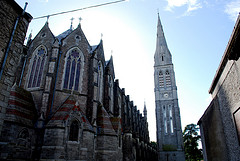Scientists at the National University of Ireland (NUI) Maynooth have devised a solution to what is a major challenge for cities worldwide − the provision of widespread, free, effective broadband.
For more than 10 years this has been a goal of cities in their drive to support the ’smart economy’, but it had remained elusive due to technological limitations.
’It’s a very complex problem and a decade of research internationally had failed to provide any real progress. The key was to stop looking for complex solutions, think differently about the issues and come up with simple answers,’ said Prof Doug Leith, director of the Hamilton Institute at NUI Maynooth.
Prof Leith said that, while free broadband has always been a logical and desired goal for society, it had proven unexpectedly difficult to provide. He pointed out that London has a new commitment to having free municipal broadband available time for the 2012 Olympics, while Dublin has had it as an objective in recent years.
The two main barriers to creating successful municipal wireless networks are interference and fairness. In order to effectively cover a city, it is necessary to provide many WiFi transmitters in close proximity to each other. However, as all are constantly broadcasting and receiving, these transmissions interfere and collide with each other, resulting in poor-quality connections for most users.
Article Continued on The Engineer…






